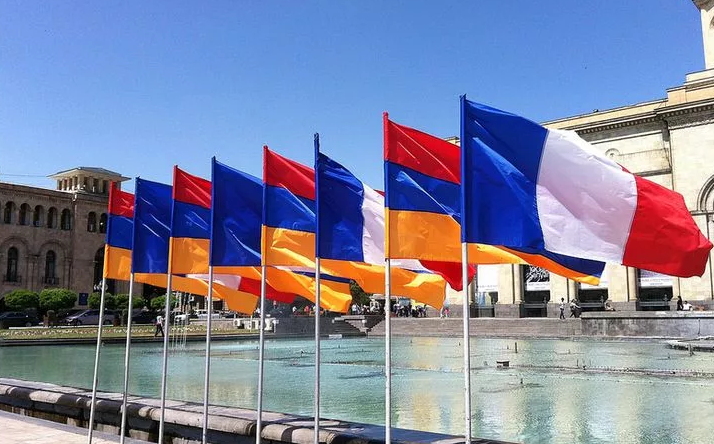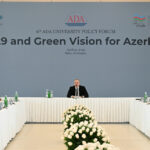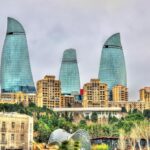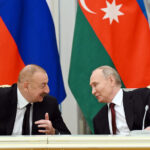Today’s France is arguably the reflection of its past given its aspirations to undermine peace far beyond its borders, including in the South Caucasus.
For decades, the French government disguised in a “peace-lover” cloak in the South Caucasus as one of the co-chairs of the infertile OSCE Minsk Group mediation structure. Alongside the US and Russia, the “roosters” have been pretending to work for settling a former conflict between Armenia and Azerbaijan in the latter’s Karabakh region. But the stones have been turned after Azerbaijan ended the conflict, restored its territorial integrity, and dashed all hopes of the separatists in Karabakh for some kind of “future” in the Azerbaijani lands.
The new realities in the region exposed the dark side of the Moon or the real face of the French authorities who hastily ran to solace the separatists and pledged assistance to keep their hopes alive. The visit of the chief separatist Araik Harutunyan to France, where he was “solemnly welcomed” earlier this week, was the next demonstration of France’s crafty intentions in the South Caucasus.
Criminal Harutunyan was extremely encouraged by the meeting with the French Senate and National Assembly members to sell his illusions about the interests of the self-designed “Artsakh Republic” (Karabakh region of Azerbaijan) in “developing relations” with France. He is convinced that the recent biased anti-Azerbaijan resolutions adopted by the Senate and National Assembly could pump the illegal claims of separatists for getting “self-determination” rights from the Azerbaijani authorities and settling the non-existing “conflict” with the largest country in the South Caucasus.
Going even further, Harutunyan also said that he is waiting for the French executive power to “recognize the independence of Artsakh”, according to Armenian media.
President of the Regional Council of Île-de-France Valérie Pécresse, a pro-Armenian politician who illegally visited the Karabakh region of Azerbaijan exactly one year ago, carried the same tune with the separatist by voicing her “solidarity and support”. Pécresse also believes that there is a conflict in Karabakh and this should be solved to bring stability and peace to South Caucasus.

SeparaPEACE
The word “peace” can be seen in the remarks, statements, and calls by almost all French politicians, including Pécresse– it is simple, according to their opinion: Paris prefers white doves to fly over South Caucasus.
But let’s remind Pécresse that the road to peace is not going through hosting a separatist, listening to his illusions, and treating him like an official from an independent country. Peace is not illegally visiting the territories of Azerbaijan for begging support in presidential elections and later being labelled as persona non-grata. It is not also taking a biased approach to regional events by remaining silent during 30 years of occupation, destruction, and vandalism.
If Pécresse and those of the same mindset as her really want peace in South Caucasus, they should know that there is no “Nagorno-Karabakh conflict” within Azerbaijan’s borders. It was irreversibly resolved by the Azerbaijani army two years ago. And any attempt to revive it, like posing for a photo with a criminal separatist in Paris, could suffocate their lovely peace.

In the meantime, Arayik Harutyunyan, the leader of the unrecognized proxy state set up by Armenia on the Azerbaijani territories, is the one who catapulted deadly missile attacks on the Ganja city of Azerbaijan during the 2020 war. Back then, he confessed that rockets fired on Ganja allegedly targeted so-called military targets in the city. But they hit civilian buildings, killing at least 32 and wounding 125.
So, again, discussing peace with such a bloody separatist is not portraying a peace-lover image but vice-versa.
Remarks by Valérie Pécresse in a meeting with criminal Harutunyan could well be established as an example of the general opinion reigning among the French authorities. The state-run France 24 TV channel and Agence France Press media organization, largely controlled by the government, could prove our observations. As part of his Paris visit, Harutunyan was hosted on this influential television channel as the “president of the Nagorno-Karabakh republic”. Agence France Press also organized his meeting with journalists in the French capital.
In both cases, the separatist again voiced his delusions of “free Artsakh people”, “independent Artsakh”, “aggressor Azerbaijan”, and “self-determination right”. Ridiculously, Harutunyan even urged direct contact between him and the Azerbaijani government to “discuss humanitarian, social and other issues”. He was provided by these French mass media giants with all the necessary opportunities to distort real facts and mislead the international community. And these illegalities were taking place in a country that co-mediated a political resolution to the former conflict in the Karabakh region of Azerbaijan.
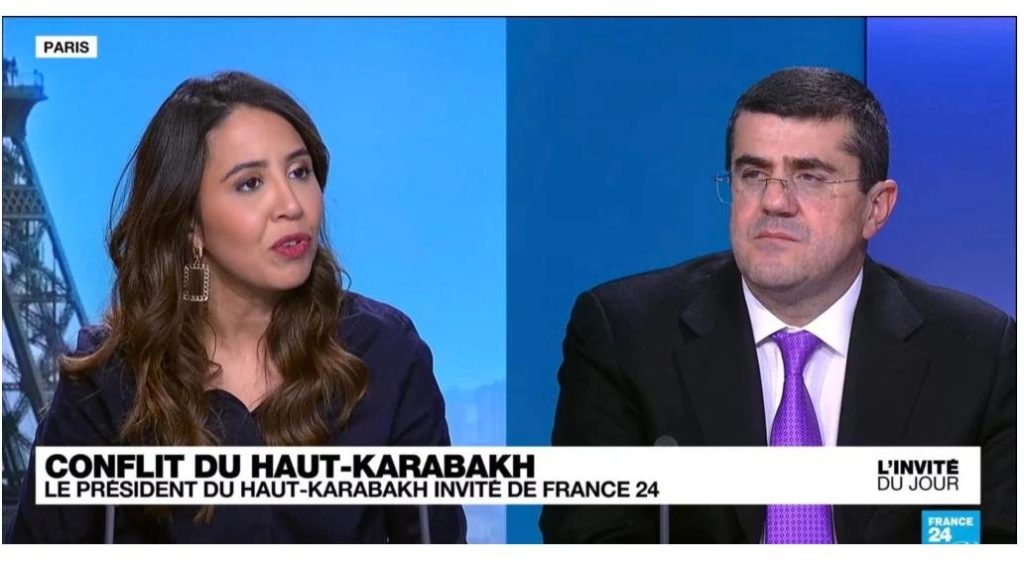
Meanwhile, Azerbaijan’s Ambassador to France Leyla Abdullayeva said the appearance of Harutunyan on the France 24 TV channel gave momentum to the promotion of separatism, as well as violated the sovereignty and territorial integrity of Azerbaijan and harms peace.
Note that during Armenia’s occupation of Azerbaijan’s Karabakh region from 1991 to 2020, France served as one of three countries chairing the OSCE Minsk Group, a mediation structure tasked with fetching a peaceful end to the Armenia-Azerbaijan conflict. The Group’s shuttle diplomacy failed to deliver on its commitments over nearly 30 years.
In addition, despite the Minsk Group’s charter calling for neutrality in the negotiation process under the chairmanship mandate, France took Armenia’s side during the 44-day war between Armenian and Azerbaijani forces in Karabakh from September 27 through November 9. President Emmanuel Macron voiced solidarity with Armenia on the fourth day of the fighting on September 30. The French government, French towns, and aid groups spared no effort to help Armenia. French cargo flights delivered medical supplies and other assistance tools to Yerevan shortly after the end of hostilities.
Following the 2020 war, the French Senate and lower house of the French parliament adopted resolutions to push the government to green-light the recognition of the so-called “Nagorno-Karabakh” region although even Armenia itself rejected to recognize the illegal separatist regime in the Azerbaijani lands.
Adieu, France!
After failing to translate its intentions into action via the Minsk Group, France, in the face of its President Emmanuel Macron, attempted to keep its destructive policy through various formats. Macron stitched himself to a meeting attended by the European Council President Charles Michel, Azerbaijani President Ilham Aliyev, and Armenian Prime Minister Nikol Pashinyan in Prague, Czech Republic, in early October. The ultimate focus of the meeting was to facilitate the peacebuilding process between Yerevan and Baku. Back then, Macton tweeted a photo from the meeting, where he was also in attendance, saying “for the durable peace in the Caucasus”.
However, following weeks, in November, the French Senate adopted a resolution suggesting the government recognize the self-proclaimed separatist formation in Karabakh, support Armenia, and condemn Azerbaijan. Later in the same month, the Francophonie organization, of which Armenia is a member, drafted an anti-Azerbaijan statement under the aegis of the French government, however, failed to adopt it due to the attempts of what President Aliyev called “friends of Azerbaijan”.
Later, on November 25, President Aliyev vetoed the next meeting, which should take place on December 7, to discuss normalization with Armenia should Macron join the gathering. He said the French president should not attend the negotiations because he “criticized and blamed Azerbaijan for what it has not done”, referring to Macron’s statement about the border clashes between Armenia and Azerbaijan in mid-September, when Azerbaijani forces foiled armed provocation of the enemy.
In a nutshell, if France wants peace in South Caucasus, if Macron works for the “durable” version of peace, Paris must stop stretching a helping hand to criminal separatists in the Azerbaijani territories and adopting resolutions against Azerbaijan. Currently, the scenario of peace in the South Caucasus has two major actors – Azerbaijan and Armenia. The road to peace goes through the fair treatment of both countries. Either be fair or leave. There is no other option. Furthermore, to put it mildly, Azerbaijan does not need the assistance of France – a sister of Armenia – in achieving peace. The 2020 war and post-war realities have already proven that Baku knows well who is who, there is no chance to deceive it.
Mushvig Mehdiyev
Caliber.Az
